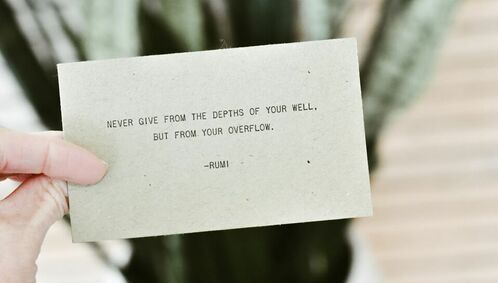|
If you are an empath, not only is self-care important it is necessary. As empaths know, being highly sensitive to other's emotional energies can leave you feeling like Atlas holding the world on your shoulders. Overtime this takes both an mental and physical toll. While it is nearly impossible for the empath to simply stop caring, there are ways to help minimize the negative effects of caring too much. Here are 3 ways you can reduce the stress and find a healthy balance between caring for yourself and caring for others. 1. Give yourself space. While some people are energized when they spend time with others, the empath is typically drained. If you are an empath, you'll need to both recognize and honor the need for more space. Sometimes this may mean physically distancing yourself. Let's take for example a crowded dinner party commonly teaming with a whole host of different energies. It can be helpful to take note of a quiet spot (even if it's a bathroom) for occasional breaks. Slip away for a few minutes for some long deep breaths, consciously releasing any emotional energy that doesn't belong to you. In addition to these smaller pockets of space it is also in your best interest to block off larger spaces as well. Build time into each day for things like mediation and connecting with nature as well as a rest day within your busy week and regular vacations throughout the year. If you are spending your downtime with someone else, be sure to communicate your need for quiet and space in order to recharge and center yourself. 2. Cleanse your energy field. Empaths pick up the energies of those around them. This is sticky business! These energies and emotions tend to latch on and accumulate. This can result in chronic moodiness, stress, and even physical problems such as headaches, ulcers, and fatigue. To prevent this plaque from building up it is essential that the empath find methods for cleaning up their personal energy on a regular basis. Practices and techniques such as reiki, yoga, massage, and meditation are key to releasing what does not belong in your energy field. Make sure to add these or any others methods you find detoxifying to your calendar as a priority rather than an afterthought. 3. Fortify yourself. Sometimes it just isn't possible to avoid all situations that may impact your energy in negative ways and that is why #3 is particularly important. A good analogy here is to think of your empathy as if it were hayfever. It is nearly impossible to eliminate your exposure to pollen entirely because pollen is blowing in the air all around you (unless you choose to live in a bubble). There are ways however to make your body stronger and less susceptible to an allergy attack. There are supplements you can take and nutritional changes you can make to lessen the severity of the exposure. Then same is true with fortifying our personal energy field. A piece of this is explained in #2 where we discussed regular energy cleansing, but there are also things you can do in a moments notice to strengthen your field so that the energies around you don't attach or accumulate. Much of this can be done through bringing your attention to the present moment. When you remain present it is easier to identify energies that is not yours attempting to make their way in. Stand tall, take a deep breath, and imagine yourself as a screen door that allows everything to flow through rather than attach. This type of fortification does not require you to become inflexible or "fight" but will aid you in knowing you have control and the ability to avoid taking on emotions that are not your own. In addition to this technique create a peaceful visualization or an affirmation you can use on the fly to keep you centered and calm. With these tips for self-care you should be able to manage your personal energy and continue doing good work in this world without feeling the prolonged and often chronic effects associated with being an empath.
0 Comments
Living and relating in the invisible field
To the person who is an empath it may be difficult to imagine that other people experience the world and those around them quite differently. Empaths come from an innate perspective that everything and everyone is connected even if they don’t quite understand or outwardly acknowledge this perspective. Empaths are often described at sponges, which is a fairly accurate description, but the reason they are so is because it is hard for them to distinguish any boundaries that exist between them and the rest of the world. As a result, empaths are quick to notice the emotional “tone” of a room and if they aren’t careful, can soon find themselves absorbing that tone even if it is an undesirable one. An interesting discovery I’ve made in working with empaths (and being one myself) is that empaths often take for granted that not everyone is wired similarly. Empaths tend to be particularly intuitive and tapped into the invisible energies around them. This ability, while often considered a gift, can bring with it a whole host of unique concerns. In addition to the well-known emotional stress empaths experience from being so energetically absorbent, they tend to also have some other lesser-known responses in common. These responses can make for some challenging and confusing relationships between them and less-empathic people. Here are just a few ways in which the empath may respond differently than others to the world around them- 1. Empaths, being particularly intuitive to the needs and desires of others, commonly experience high levels of frustration when their loved ones, friends and co-workers are not as sensitive to theirs. Rather than directly asking for what they need they may assume others should already know. 2. Empaths, being accustomed to the world of non-verbal forms of communication, often have difficulty finding their own “voice”. It’s hard to chime in, especially in group settings, when you are dealing with the onslaught of energetic noise. When an empath is feeling this type of overwhelm it’s just easier to take the backseat in conversations. 3. Empaths commonly live their lives in accordance with unseen energies they are receiving and interpreting. Frequently they make their decisions based heavily on this subtle information or intuition. As a result, empaths often feel judged or misunderstood by others who respond only to what can be experienced with the five senses. 4. Empaths, being highly sensitive, often suffer from auto-immune conditions or allergies in response to chemicals and synthetic products. Even on a cellular level they are picking up and reacting to substances that are an unnatural fit for their bodies. Those who have a less sensitive systems may assume the empath is just being a picky or even judge them as being a hypochondriac when they are indeed having a real physiological response to their environment. 5. Empaths, because they can frequently sense potential danger, may have a tendency towards worry and fear. Unfortunately these reactions can limit their quality of life and their relationships if the empath does not find ways to distinguish true life-threatening danger from common everyday challenges. While I’m sure there are many characteristics of empaths that I may not have shared here, my intent is to shed light on some that are not typically discussed. Whether you are an empath or someone who loves one, my hope is that this list helps to create a bridge between our differences and opens up dialogue that strengthens our bonds. |
AuthorHello dear readers! My name is Traci Davis. I am an Intuitive Advisor (Psychic Medium who specializes in spiritual mentoring). This blog is designed to bring you tips, tools, and product recommendations for living a life aligned with your soul's purpose. Archives
October 2019
Categories
All
My
Spring 2019 Reads |






 RSS Feed
RSS Feed